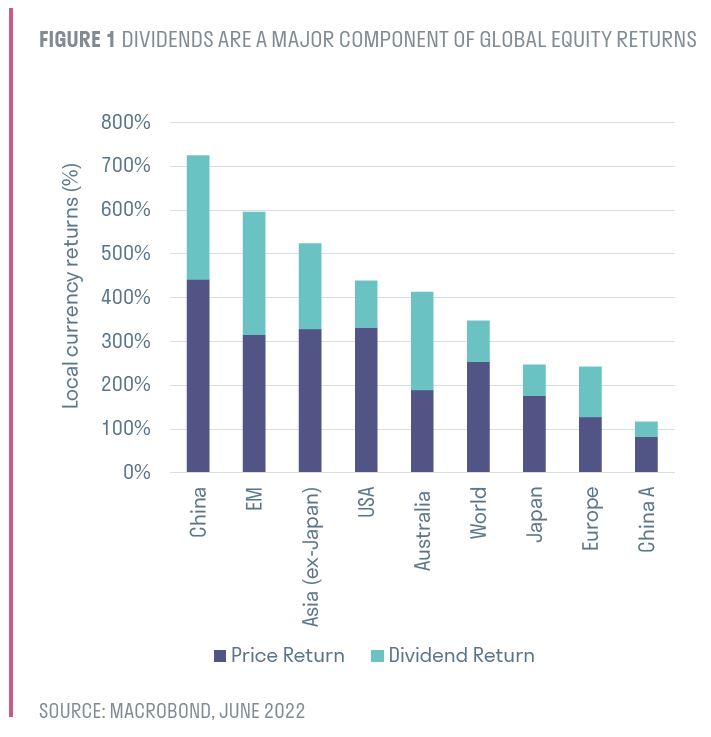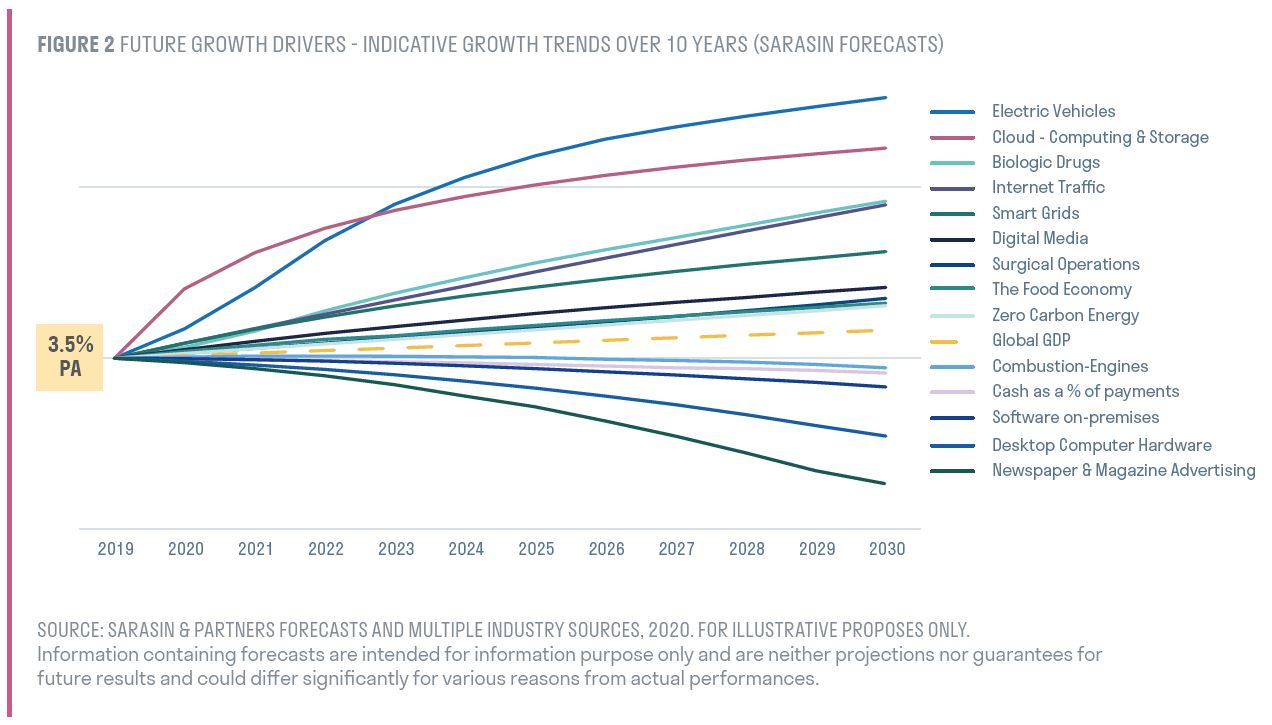Quiet disruptors offer durable sources of dividend growth
As economic conditions decline we can expect lower investment returns to become the norm, with dividends comprising a bigger share of the total returns available. But how are investors to identify which companies’ dividends will endure and, just as importantly, provide dividend growth that can help fend off inflation?
Perhaps most dangerous for many investors are ‘inflation traps’ – companies that appear able to pass inflation through to customers but, because of the cyclical nature of their businesses, cannot be relied upon when recession bites.
Our thematic approach points us towards well-run, responsible companies that are likely to thrive as society changes, and share an increasing amount of their profitability with shareholders. In particular, we are drawn to innovative businesses whose intellectual property provides a long-term, protected source of earnings that is often misunderstood, and therefore mis-valued, by equity markets.
After the carnival
Equity investors have always had a strong affinity with dazzling innovations. History is littered with examples of high expectations leading to steep valuations and dashed hopes, from the Railway Mania of the 1840s to the Dotcom bubble.
Innovative breakthroughs have yielded amazing benefits for society, but most have taken a lot longer to come to fruition than investors initially suspected. Bill Gates’ observation that we “…always overestimate the change that will occur in the next two years and underestimate the change that will occur in the next ten…” is oft-repeated. His following words are usually omitted: “Don't let yourself be lulled into inaction.”
After the equity market carnival has moved on, the less glamorous, laborious and time-consuming work of implementing disruptive innovations gets under way. The real long-term benefits of an innovation often accrue to what we call the 'quiet disruptors', companies that put in the leg-work of applying innovation in practical ways that make a real difference. The second mouse gets the cheese.
Stealth wealth
'Innovative' and 'disruptive' are two adjectives that rarely surface in the context of equity income investing. Higher dividend stocks are often assumed to be twilight companies in sunset industries that are seeing out their remaining days in quiet dotage or are likely to find themselves on the wrong side of history as the world moves towards a low-carbon economy.
This is partly due to equity markets’ (and the media’s) bifurcation of companies into opposing camps of predators and prey, old and new economy, disruptors and the disrupted, which makes for a dramatic narrative but is usually an oversimplification. By looking at the world through a thematic lens, we have identified a category of companies that are behind-the-scenes, quiet disruptors. These are established and growing businesses, where investors can be on right side of history and also benefit - today - from healthy cashflows, profits and dividends.
When investors think of innovative disruptors, it is usually long-duration, higher volatility, higher return stocks that spring to mind. These are the 'extrovert' disruptors beloved of high-conviction growth investors. Some of these companies have produced incredible risk-adjusted returns and become household names. However, they are not what we are seeking to include in our clients’ equity income portfolios.
Our thematic approach points us towards well-run, responsible companies that are likely to thrive as society changes.
Quiet disruptors, by contrast, present a very different risk profile that sits near the opposite end of the equity risk spectrum. Their lower risk and lower return profile is more typical of mature cyclical or defensive franchise companies. To many investors they do not look like disruptors and the full implications of their innovations are often missed.
Our experience in running global thematic equity income mandates over the past 15 years has taught us that these less volatile, quiet disruptors produce superior risk/returns over time, not least because the market underestimates
their potential and misprices them accordingly. Since 2001 nearly 50% of the total returns across all major equity
markets have come from reinvested dividends.1

Strength in diversity
Quiet disruptors tend to provide durable income streams from businesses that can look forward to long-term organic growth but they can hail from very different industries. This is clearly desirable for well-diversified, resilient portfolios.
One example is Air Liquide, the world’s second-largest supplier of industrial gases and part of our Climate Change investment theme. The company doesn’t garner the lofty valuations of a fuel cell start-up company but it is instrumental in expanding the world’s ability to generate clean hydrogen, which will be in increasing demand as an alternative energy source. In addition to being a central player in a key industry of the future, Air Liquide‘s business has proved to be robustly defensive in downturns.
Turning to our Ageing investment theme, Medtronic is a US-based company that specialises in minimally invasive surgery, miniaturisation of medical devices and medical robotics. Medtronic’s development of its Hugo device brings welcome competition to robotic surgery. This is raising the pace of innovation and, we believe, will give patients around the globe unprecedented access to surgical skills at relatively low cost.
A third quiet disruptor is DS Smith, the second-largest producer/supplier of corrugated packaging in Europe and a Sarasin portfolio holding under our Evolving Consumption theme. DS Smith’s innovative approach to circular-use packaging is enjoying strong organic growth due to e-commerce and demand for recyclable/reusable packaging. DS Smith is committed to manufacturing 100% recyclable or reusable packaging by 2023 and aims for all its packaging to be recycled or reused by 2030.
Volatility brings opportunity
As investors who focus on long-term thematic trends, short-term market volatility can provide us with buying opportunities. Most recently, a number of ‘pandemic winners’ have fallen out of fashion in the stock market but continue to pay durable dividends flowing from underlying businesses that can look forward to long-term structural growth.
One such example is Prologis, whose highly capable management has successfully used acquisitions to build a world leader in logistics real estate that can cater for companies such as Amazon. Despite recent slowing of internet sales, the growth of e-commerce has many years to run, and we have therefore taken the opportunity to increase our exposure to Prologis.
Furthermore, some COVID winners (Prologis included) now have significant cash hoards. Perhaps the most striking of these is the pharmaceutical sector, which has a US$500bn war chest available to spend on acquiring smaller biotech players – many of which are currently trading at extremely low valuations. Pfizer alone has capacity to spend about $80bn over the next five years that would add to Pfizer’s portfolio of intellectual property and R&D capabilities.
Income investors DO have a choice
Most investors want to do the right thing. Anyone who doubts this need look no further than the vast sums that have flowed in recent years into funds that offer an ESG focus. When it comes to equity income investing, however, many fund managers are curiously content to retain exposure to high dividend payers in harmful industries such as traditional energy and tobacco.
Some may believe that they will be able to exit these companies before the music stops – or perhaps they hope that the music will never stop. To our mind, neither of these positions is defensible for any asset manager who is engaged as a long-term steward of their clients’ capital.
Income investors do have an alternative to traditional income stocks, and the long-term performance of funds such as the Sarasin Global Higher Dividend and Global Dividend funds bears testament to this. We passionately believe that income-orientated stocks can be interesting and disruptive. We thoroughly enjoy the challenge of seeking new income ideas for our clients among overlooked quiet disrupters.




